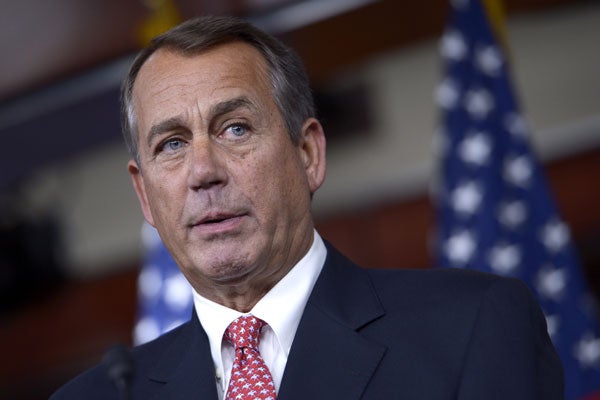House Speaker John Boehner (R-OH) and Republican leaders have done it once again. Their latest fiscal cliff proposal capitulates on core conservative principles, yielding woefully inadequate concessions from President Obama in the process. Will they ever learn?
The latest GOP offer essentially ignores Washington’s real problem — spending — and puts a $1 trillion tax hike on the table. It’s so bad that conservatives are now left with only one unfortunate alternative — passing a temporary measure that avoids a doomsday scenario until the end of March. It’s the best possible outcome with the days dwindling on the remainder of 2012.
In a city where kicking the can has become a routine course of action, it’s hardly the preferable outcome for lawmakers. But it would be better than just going over the fiscal cliff and better than the current $1 trillion tax increase offered by Boehner, which, not surprisingly, was summarily rejected by Obama, who proceeded to counteroffer with an even bigger tax hike and even fewer spending cuts. At this point, no “grand bargain” is going to result in the spending cuts that are needed to reduce the debt.
Yesterday, Heritage’s Alison Acosta Fraser outlined a few reasons why Boehner’s latest proposal is just plain bad policy:
- Higher tax rates discourage all the activities that lead to a stronger economy. That’s even something Obama acknowledged when he signed legislation preventing a similar tax hike two years ago.
- Dollar-for-dollar tax increases and spending cuts — Boehner’s plan — won’t fix what’s broken. Spending cuts, not a $1 trillion tax hike, should be the GOP’s focus.
- After two years of running the House, there’s still no clear plan how Republicans would cut spending. Even as of this late date, they have provided few real guiding principles or details on spending reforms. It’s the $800 billion question.
- Relinquishing control over the debt limit to Obama for a year would take away one of the only points of leverage for conservatives. It ensures no meaningful reforms will happen in 2013.
These factors make it clear that any deal this year will be a disaster. That’s why Fraser recommends kicking the can until the end of March. This alternative is hardly ideal, but given the situation created by lawmakers, it’s the best possible outcome for Americans.
So why March 31? Heritage’s J.D. Foster, the Norman B. Ture Senior Fellow in the Economics of Fiscal Policy, said it will give conservatives an opportunity to “live to fight another day” with better leverage at the negotiating table.
Here’s how the temporary plan would play out, according to Foster:
- The measure would postpone the dreaded fiscal cliff until next year, extending all tax rates and all spending policy without sequestration cuts.
- Legislation funding the federal government expires on March 31, meaning that Congress must act by that date to prevent a shutdown.
- The debt ceiling would increase, but only enough to allow the government to continue to operate until just after March 31. Congress would retain control of the debt limit.
- Some 28 million taxpayer would avoid paying the Alternative Minimum Tax. A patch for 2012 would save an average of $2,250 for those taxpayers.
- Doctors wouldn’t face deep cuts for Medicare payments in January.
Let’s be clear: Kicking the can is not the preferable outcome. But, sadly, it is better than the only available alternatives.
Quick Hits:
- Representative Tim Scott will be the next senator from South Carolina in January. Senator Jim DeMint is leaving to become president of The Heritage Foundation in April.
- NBC chief foreign correspondent Richard Engel and several colleagues escaped from their captors after being held for five days in Syria.
- Abortion, gay marriage and immigration were the top three election-related search queries on Google in 2012. Representative Paul Ryan, the GOP vice-presidential nominee, topped the list of politicians.
- The Hurricane Sandy relief bill is a perfect example of the spend-now-save-later practices that are driving the government deeper in debt, writes Heritage’s Patrick Louis Knudsen
- Washington Redskins rookie quarterback Robert Griffin III has the best-selling football jersey in a single season since the NFL started keeping track.
